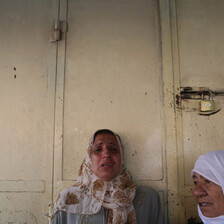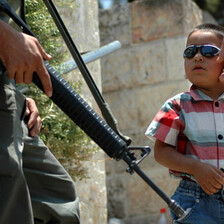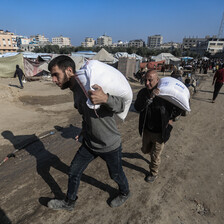The Electronic Intifada Rafah, Gaza Strip 24 October 2007
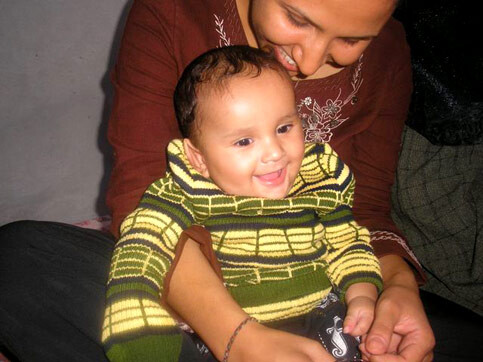
The author holding her cousin’s infant son, Eyad.
Five-month-old Eyad is one of the happiest babies I’ve ever met. Barely touch his cheeks and he smiles and giggles; tickle his little belly and he bursts out in laughter, kicking his feet up in the air. When he laughs, it involves his whole body, pushing out this loud giggly sound that’s full of happiness. Eyad doesn’t cry like other babies when he is alone. He just lies there quietly and plays with his hands and feet. But if he sees you, or senses you anywhere near him he starts to laugh again and kick his feet up in the air with excitement so you can play with him. Jamalat, his mother, says his laughter is a blessing from God for it fills her heart with joy and takes away some of her heartbreak and sorrow.
Eyad has never seen his father, and his father has never seen his son, nor will he ever. Jamalat was just five weeks pregnant with Eyad when his father, my cousin, was killed by an Israeli sniper during an incursion into the town of Sufa in the south-east of the Gaza Strip. He had just asked Jamalat to prepare some tea for him and went to sit in front of his house with his then two-year-old daughter Malak. It’s clear that the sniper had every intention of killing him rather than just injuring or disabling him, for he did not shoot him once or twice or in the leg or arm but rather he aimed and shot him three times, in his stomach, his chest and his neck. The stomach wound was deep enough to kill him, but he was shot again in the chest anyway. He fell to the ground and laid there, half alive, hanging between life and death. He was still moving and the blood was running through his veins until the final shot to his neck came minutes later. It eliminated every ounce of life left in him.
Jamalat did not rush to see what had happened for incursions occurred regularly in Sufa and she had gotten used to hearing them. She didn’t think to see where the gunshots came from until Malak ran over to her crying with her father’s blood over all her face and clothes.
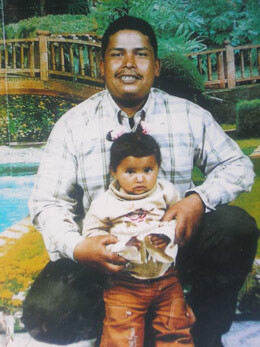
Eyad with his daughter Malak a few weeks before he was killed.
When this happens it is possible that no one else in the area knows that the IOF have taken over a home or even that they are in the neighborhood. Typically, for the next day or so, the army assesses the area and quietly plans. When it’s ready, the army leaves the home to make arrests, kill so-called “militants” or raze Palestinian homes and agricultural lands. When they’ve finished they pull back their tanks and bulldozers only a short distance to the border with Israel where they are always stationed, sitting and waiting for their next incursion into Gaza.
Jamalat and my cousin had only been married for four years when he was killed. They had just moved into their new house they built on the land he inherited from his father. Jamalat says God has taken her husband away from her, only to give her a son with the same face as his father’s, like the name they also share.
It’s hard to watch and hear Eyad laugh without experiencing heartbreak. He has no idea about the world in which he will grow up. He will grow up with only stories and pictures of his father. He will see his mother struggle to feed him and his siblings. He will be told he is a refugee, and get used to waiting in line with his mother for their food packages. He’ll learn to sleep with the sounds of Israeli planes over his head. He will recognize the loud rumbling sounds of tanks coming into Gaza from the border and how that sound means it’s time to run home. Anger will fill his heart when he witnesses Israeli bulldozers crush his father’s olive trees. And he will live his entire life under Israeli occupation in an unjust world where he will think such conditions are normal, knowing no other life than this.
He will never see the face of the Israeli solider who killed his father, nor receive reparations for the life he will live. And the Israeli solider will never realize what he has done or whom he has hurt, for he has dehumanized Palestinians as well as himself. For a fellow human being would at least consider for a brief second while he aimed his rifle that the man in his sights was someone’s father and was loved dearly by his wife and had a whole life ahead of him, one cut short with the pull of a faceless soldier’s trigger.
All images by Yassmin Moor.
Yassmin Moor is a Palestinian-American writing from Rafah, Gaza. She is currently working to implement a gardening project through an organization she co-founded, Save Gaza. Yassmin can be reached at yasminemoor A T gmail D O T com.

